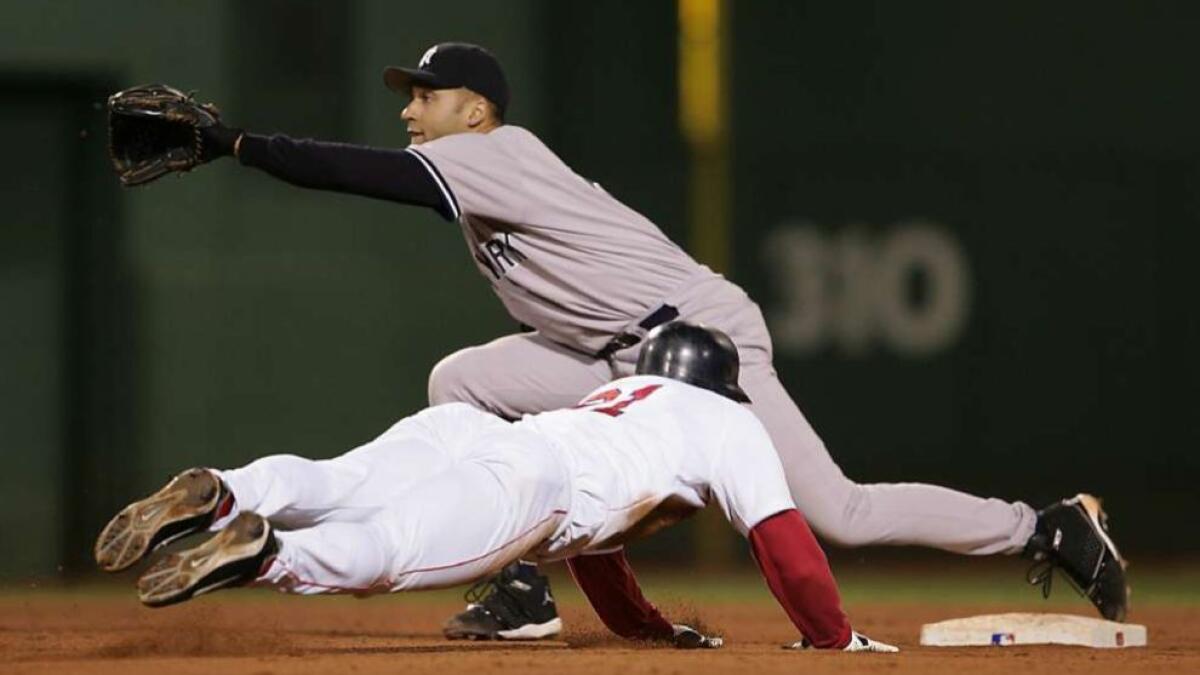Leaving ‘the steal’ behind in Boston, Dave Roberts took path that led to Dodgers
- Share via
Dave Roberts found the note after his flight home to San Diego. In the fall of 2004, Roberts and the rest of the Boston Red Sox had paraded down the banks of the Charles River to christen an improbable championship. Roberts was a role player on the team, but he relished his contributions. He did not realize their magnitude until he saw the message left on his suitcase by a baggage handler at Logan International Airport.
“You’re going to be a Red Sox legend forever,” it read.
Roberts had played six seasons in the major leagues, and he would play four more, but his place in baseball lore became anchored on Oct. 17, 2004. He was the man who stole the base that sparked the comeback that ended the Curse of the Bambino.
When he swiped second and scored in Game 4 of the American League Championship Series, Boston staved off elimination. The Red Sox overcame a three-games-to-none deficit to defeat the New York Yankees, then ended an 86-year World Series drought.
Roberts never played again for Boston. For years, he still heard grateful messages from members of Red Sox Nation, the club’s legion of fans. The outpouring of affection overwhelmed and humbled him. He felt gratitude for his place in the sport’s culture. Yet after he retired, and after he spent a year as a broadcaster in Boston, Roberts yearned for more. He did not want his legacy to be one stolen base.
So began the journey that led him to the Dodgers dugout, where he will be when the World Series begins on Tuesday at Fenway Park. In his third season as manager, Roberts hopes to shepherd the Dodgers to their first championship since 1988.
“This is something that I plan on doing for quite some time,” Roberts said. “To lead an organization like the Dodgers to a championship is something I’d also like to be known for.”
He added: “And now it’s come full circle. We have a chance to meet again. You can’t script it any better.”
The homecoming adds another layer of incentive as the Dodgers pursue the elusive title and Roberts pursues a capstone for his managerial resume. Roberts won National League Manager of the Year in his debut season of 2016. During the last two years, he became the first Dodgers manager since Tom Lasorda in 1977 and 1978 to lead the franchise to back-to-back pennants..
The 2017 season ended in heartbreak, with a loss in Game 7 of the World Series to Houston. Roberts guided the team through a shaky start this spring and a late-summer slump to win a sixth consecutive National League West title, and then defeat Milwaukee in the National League Championship Series last week.
Though the Dodgers have yet to extend his guaranteed contract beyond 2018, Roberts has emerged as the model of a modern manager in the eyes of rival executives: A former big-leaguer accessible enough to communicate with his players, stern enough to keep his clubhouse in order, inquisitive enough to accept the newfangled edicts delivered from his front office, and sage enough to trust his instincts in the heat of competition.
“I think it’s that he understands that if you’re prepared, you should not fear failure,” said former Dodger Adrian Gonzalez, a close friend of Roberts. “You’re going to fail because it’s part of baseball, but you shouldn’t fear it.”
Roberts honed those instincts during his time as a Dodgers outfielder from 2002 to 2004. He spent three seasons as a reserve for Cleveland before the Dodgers acquired him. During his first spring in Vero Beach, Fla., Roberts spent hours with instructor Maury Wills, a seven-time All-Star and base-running specialist, who sharpened his skills.
Roberts would never be a slugger or win a batting title. But Wills recognized Roberts’ potential on the bases. They drilled on the details, like how to study the opposing pitcher or how to decide the length of a lead at first base. One day during that spring, Wills concocted a scenario for Roberts: When the entire stadium knew he wanted to steal second base, Roberts needed to possess the courage to run anyway.
The message stuck with Roberts after the Dodgers traded him to Boston in the summer of 2004. The Red Sox used Roberts for late-game defense and pinch-running opportunities. They acquired him precisely for a moment like the ninth inning of ALCS Game 4, when Kevin Millar took a leadoff walk against Yankees closer Mariano Rivera, and Boston needed a run to survive.
Red Sox manager Terry Francona replaced Millar with Roberts at first base. As Roberts climbed the steps from the dugout, Wills’ words reverberated through his mind. Rivera eyed Roberts with caution. The pitcher tried to pick Roberts off with three throws to first. After the third, Roberts gazed at the umpire and visibly exhaled. When Rivera finally made a pitch, Roberts took off, blazing into history.

The fastball from Rivera rode out of the strike zone, which created a throwing lane for catcher Jorge Posada. The ball reached shortstop Derek Jeter as Roberts dove across the dirt. His fingertips touched second base just before Jeter applied the tag.
“Every time I watch that tape, I think to myself, ‘My God, how is he not out?’” said Jed Hoyer, who was then a member of Boston’s front office. “The perfect pitch to throw on. A great throw. Only a great base stealer, who was exceptionally well-prepared, could be safe on that.”
Roberts scored on a single two pitches later, tying the game 4-4. The Red Sox won in extra innings that night, and won every night for the rest of the season. Boston traded Roberts that winter, but his place in Red Sox history was secure. When he returned to Fenway Park as a San Francisco Giant in 2007, the crowd showered him with a 54-second standing ovation. When he retired two years later, Roberts took a job with NESN, the Red Sox television station.
That year was pivotal for Roberts as he searched for his next professional calling. He commuted from San Diego, catching red-eye flights to meet the team in Kansas City or Minneapolis. The job did not suit him. He felt disconnected from the camaraderie of the game.
“When you walk into a clubhouse as media, you’re not part of the team,” Roberts said. “And I had only known being part of a team.”
On a daily basis, Roberts met fans who thanked him for 2004. He tried to be gracious, but did not want to create the perception he was still searching for the spotlight. “I was trying to do everything I could to make it about the current players,” he said, and he understood that he might never be able to do that in Boston.
A lifeline emerged that offseason when San Diego hired Hoyer as their general manager. Roberts called Hoyer and offered his services.
“It was a natural fit to bring him on,” said Hoyer, now general manager of the Chicago Cubs. “I felt like he was such a high-energy, intelligent, high-character guy that it would have been crazy not to want him working in the front office.”
Roberts spent a season in Hoyer’s baseball operations department, making contributions while undergoing treatment for Hodgkin’s lymphoma. The ballpark was his sanctuary while he battled the disease. He sat in Hoyer’s suite during games at Petco Park and soaked in the environment.
By the spring of 2011, Roberts was considered cancer-free. He had accepted a position on the big-league coaching staff of the Padres, starting the apprenticeship that led him to interview with the Dodgers in the winter of 2015.
In Los Angeles, Roberts has weathered a variety of storms. He absorbs criticisms for his bullpen machinations and lineup alterations. He understands what a championship would mean for the Dodgers, both the franchise and its fans. He lived it in Boston.
“He had a really good career, but he was going to be known for a stolen base in Game 4 of the ALCS,” Hoyer said. “And now he’s had such a great managing career — and he’s only going to get better from here. It’s wonderful to have a second thing to be known as.
“He’ll always have the stolen base. And now he’s only added to that.”
Twitter: @McCulloughTimes
More to Read
Are you a true-blue fan?
Get our Dodgers Dugout newsletter for insights, news and much more.
You may occasionally receive promotional content from the Los Angeles Times.











